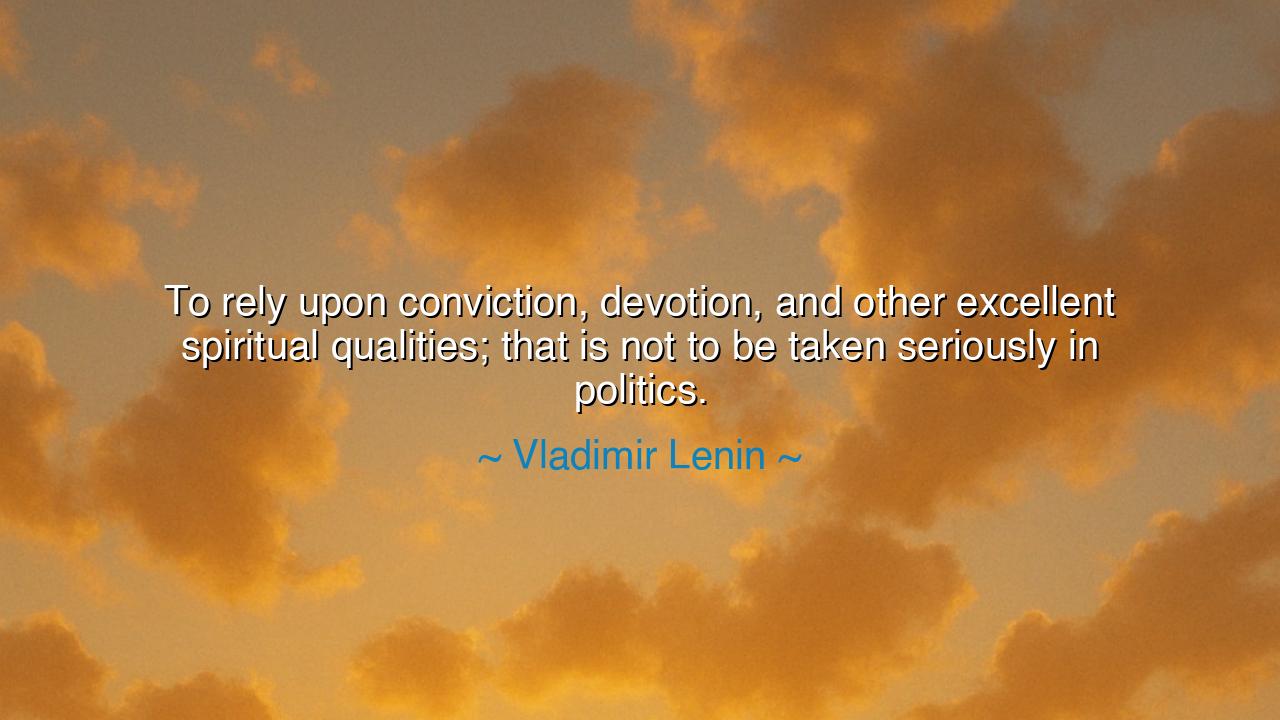
To rely upon conviction, devotion, and other excellent spiritual
To rely upon conviction, devotion, and other excellent spiritual qualities; that is not to be taken seriously in politics.






The words of Vladimir Lenin — “To rely upon conviction, devotion, and other excellent spiritual qualities; that is not to be taken seriously in politics.” — cut through the illusions of noble intent with the sharp edge of pragmatism. He declares that in the brutal arena of politics, lofty virtues alone cannot prevail. Conviction and devotion may stir hearts, but without strategy, force, and calculation, they are but fragile banners torn by the storm. To enter politics armed only with ideals is, in Lenin’s view, to walk unshielded into battle.
The meaning of this teaching is sobering. While the human spirit treasures qualities like faith, sacrifice, and vision, Lenin reminds us that politics is not governed by the same laws as poetry or philosophy. It is a contest of power, shaped by alliances, betrayals, and the cold machinery of statecraft. Thus, to place trust only in the purity of one’s spiritual qualities is to invite defeat at the hands of those who wield cunning and strength without hesitation.
History itself proves this claim. Consider the fate of the French Revolution. In its dawn, men proclaimed liberty, equality, and fraternity with blazing conviction. Yet when that fire was not tempered with order and discipline, chaos devoured the dream. Idealists were swept aside by pragmatists like Robespierre and, later, Napoleon, who understood that politics demands not only ideals but also the ruthless tools of power. In this, Lenin’s words echo as both explanation and warning: vision alone does not sustain a revolution.
The origin of Lenin’s belief lies in his own struggle. As a revolutionary, he saw movements of passion rise and collapse when they lacked structure and discipline. He believed that without organization, planning, and the strategic use of power, even the most righteous cause would wither. For him, devotion was valuable only when bound to action, and conviction only when sharpened into strategy. Thus he forged a movement where spiritual fire was disciplined by political machinery.
Therefore, O children of tomorrow, take heed of this paradox. Do not despise conviction or devotion, for they are the soul of action, the sparks that ignite the will. Yet do not mistake them for enough. In the realm of politics, ideals must be clothed in strategy, and passion must walk beside prudence. For without power, ideals perish; but without ideals, power corrupts. The true statesman must bind both together, lest he be devoured by one or destroyed by the other.






THNguyen Thanh Hai
Lenin seems to make a strong point about the nature of politics, but I’m not sure if I agree. Sure, politics often involves power plays and compromises, but can’t we have both strategic thinking and devotion to a cause? Isn’t that the balance that can drive meaningful change? Can a leader who lacks conviction truly inspire others? If all politics is just about pragmatism, would we even have the ambition to make the world a better place?
BLBao Le
This quote from Lenin really challenges the notion that politics can be about more than just strategy. But if we follow his logic, does that mean there’s no place for passion or belief in leadership? In a way, it feels like he’s suggesting that politics requires a coldness that might be at odds with our better instincts. But is that really the only path to success, or is there room for a leader who genuinely believes in their cause?
TDvan tuan dinh
Lenin’s statement seems to dismiss the role of conviction and spiritual qualities in politics, which is a bit disheartening. Are political leaders truly only successful if they play by the cold, hard rules of power? Where does this leave ideals like justice, equality, or fairness? If politics were entirely pragmatic, would we still have the vision to fight for the greater good, or would it just become a game of self-interest and manipulation?
LNLe Nhi
I’m torn by Lenin’s quote. On one hand, it’s hard to ignore the reality that politics often operates on a more strategic, calculated level than purely on conviction. But on the other hand, doesn’t politics need to be driven by values and principles for real change to happen? If we completely discard spiritual or moral qualities from politics, can we truly build a society that’s fair and just?
VDvan doan
Lenin's perspective here is somewhat cynical, but it's also an interesting take on the role of ideals in politics. He seems to suggest that relying on things like conviction or devotion in politics is naïve, which makes me question: should politics be more about pragmatism and strategy than about values and ethics? Can someone truly succeed in politics without some level of moral or spiritual commitment, or is it all just about power and tactics?